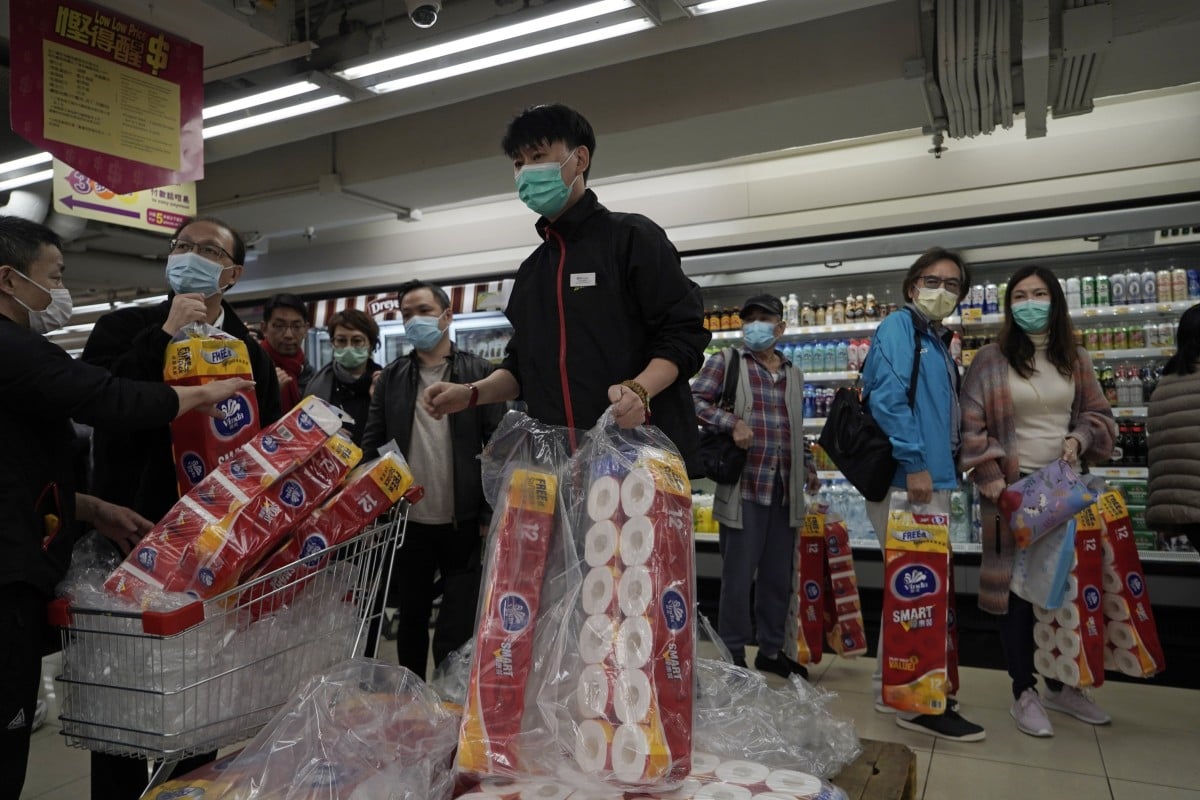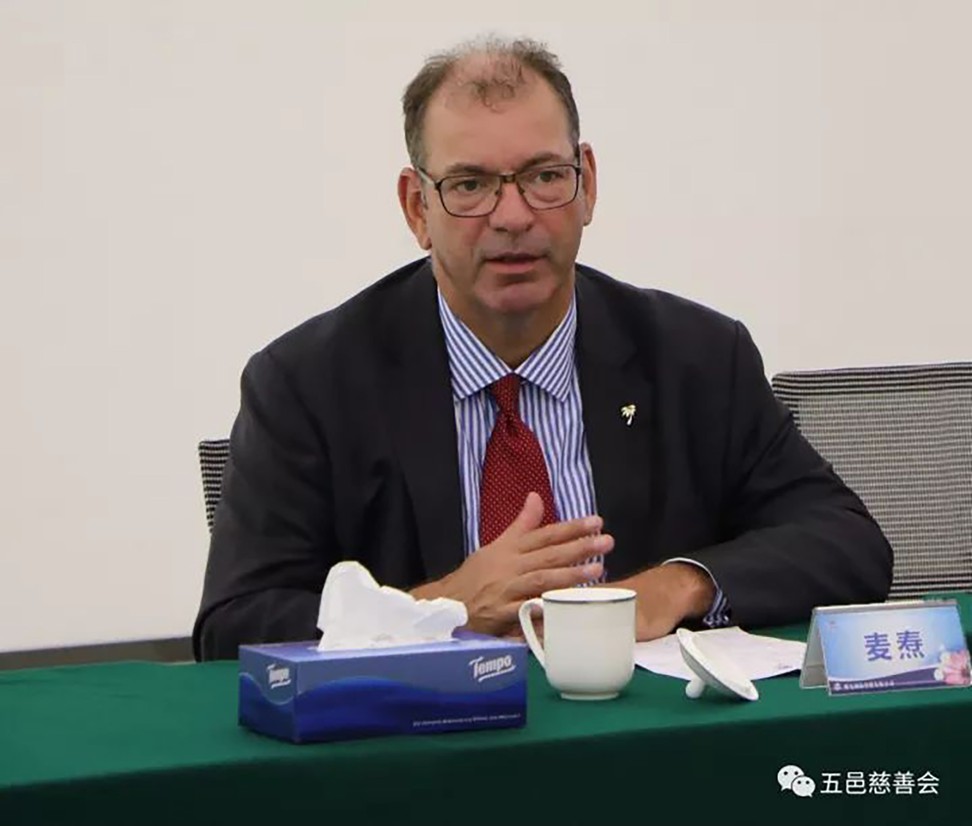Amid mysterious runs on toilet paper from Singapore to Sydney, world’s number 2 producer says shortage rumour holds no water
- Vinda International Holdings says the company would resume work next week at its Hubei factory, bringing the last of its 12 production lines back online
- The company is on track to churn out 1.3 million tonnes of paper this year, its chief executive said

Yujing Liu
Published: 8:15am, 7 Mar, 2020
1.3k
Customers grabbing their toilet paper supply at a supermarket in Hong Kong, on Friday, February 14, 2020. Photo: AP
Johann Christoph Michalski, the chief executive of Vinda International Holdings, was incredulous when word started spreading on social media in early February that toilet paper was about to run out in Hong Kong.
Within days, supermarket shelves across the city would stand empty as long queues of shoppers made
off with multiple bags of toilet paper rolls
in the misguided belief that a coronavirus outbreak in mainland China would disrupt supplies. The self-fulfilling prophecy soon found its way around the world, with similar reports of panic shopping for toilet rolls, tissue paper
from Singapore to Sydney
.
“There are no supply shortages in Hong Kong or in China,” Michalski said in an interview with
South China Morning Post, adding that people should not believe everything they read on social media.
Whatever shortage reported at the shops were “actually created by panic buying, rather than the ability of the industry to provide products,” he said. “Panic buying is very disruptive to our logistics, customers and manufacturing.”
Johann Christoph Michalski, chief executive officer of Vinda International Holdings. Photo: Sohu
The panic hoarding of toilet paper added to the rush for surgical masks, rubber gloves, disinfectants, and other daily necessities, going some ways to explain why Vinda’s shares soared 48 per cent this year on the Hong Kong stock exchange, outperforming the 7.2 per cent decline on the benchmark Hang Seng Index. Vinda’s shares closed Friday at HK$21, for a weekly gain of 4.7 per cent.
Advertisement
As Vinda resumes output next week in Hubei on the last of its 12 production queues in mainland China, the company is back on track to churn out 1.3 million tonnes of paper this year, Michalski said.
Vinda is 52-per cent owned by Essity Group Holding, the world’s second-largest producer of tissue paper. Essity in 2017 was spun off as a hygiene and health care business from
Svenska Cellulosa Aktiebolaget
, a pulp and paper producer that traces its root to Sweden in 1929.
The group – its name is a compound word made up of “essentials” and “necessities” – makes products for personal care and professional hygiene, offering a dozen brands including Vinda, Tempo and Lotus.
HK BUSINESS BRIEFING
Get updates direct to your inbox
SUBSCRIBE
By registering, you agree to our
T&C and
Privacy Policy
Vinda also makes wet wipes, adult diapers and sanitary towels. It's the largest producer of tissue and toilet paper in the region, with 18 per cent of China’s market and supply 37 per cent of Hong Kong’s consumption. Last month, it invested in two production lines to make masks in Guangdong and eastern China’s Zhejiang province.
Infographic: All you need to know about the global coronavirus outbreak
Mainland China contributes to three-quarters of Vinda’s annual sales, with Malaysia and Hong Kong making up the biggest markets outside the mainland, according to 2018 data. Helped by China’s demand, Vinda’s 2019 net profit jumped 75 per cent to HK$1.4 billion, beating a Bloomberg survey by 14 per cent, as cheaper pulp prices increased its margin.
The coronavirus outbreak in China had forced an estimated 50 million workers to stay at home as the government ordered an extended Lunar New Year holiday to contain the pathogen’s spread. As a result, some of Vinda’s shipments were delayed in February by road blocks between its factories and the ports, although Michalski does not expect a significant impact to the company’s overall production and sales.
China is the world’s largest exporter of toilet paper. The country ships US$2.8 billion worth of rolls each year, making up 12 per cent of the global toilet paper export market, according to data from the Observatory of Economic Complexity, a US-based trade monitor.
China’s logistics network is gradually getting back on track, and the company has also stockpiled wood pulp for three to four months’ use ahead of the Lunar New Year holiday, which has shielded it from any shortage of key raw material.
Advertisement
“We still expect our profitability to increase for 2020 compared to 2019, and expect to grow in a significant way,” Michalski said.
Ironically, shipment to Hong Kong may slow in the coming months, because households are probably overstocked with toilet paper, he said, adding that Vinda spent a week transferring products from the neighbouring Guangdong province to the city.
“Our supply chain is made for regular replenishment and we can cope quite easily with surges like 10 per cent or 15 per cent … but when you have surges like in Hong Kong across the board and across [product types], it’s very difficult for our supply chain to follow.”








